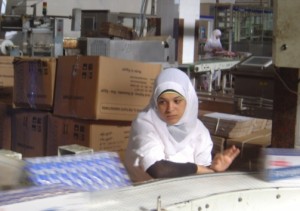The report entitled “Trade and Access to Finance of SMEs: Is there a Nexus?” co-authored by Hala El-Said, Mahmoud Al-Said and Chahir Zaki underlines that, despite the banking reforms initiated in Egypt in 2004, SMEs’ access to sufficient and appropriate financing remains limited. This represents a handicap for these SMEs to access the international markets, with only 6% of them exporting their products or services.
EGYPT. The report, presented at the workshop organised by FEMISE, AMSE and the GDRI on 6th October in Aix-en-Provence, looks at the correlation between the internationalisation of small and medium-sized enterprises (SME) and access to financing. In this report, the authors give evidence that an SME’s chances of exporting is highly dependent on the arrangements they have with the banks and the bank services used. Those businesses with access to bank services are 1.8 times more likely to export. For those that use a credit organisation, this ratio climbs to 5 to 1.
The study also takes into account other factors such as the business’s maturity, its geographic location and its capital. “Only 1.8% of SMEs with a capital of less than EGP 250,000 (US$30,000) export”; the greater the capital, the more export activities. Size also appears to be a crucial factor. The report points out that, in Egypt, “an SME employs less than 10 people on average, whereas most exporters employ more than 50”.
Recommendations
The stakes are high, since efficient and accessible financial services would allow Egyptian companies to make inroads into international markets and provide an outlet for Egyptian goods and services.
In their report, Hala El-Said, Mahmoud Al-Said and Shahir Zaki are campaigning for more Egyptian SMEs to be included in the multinationals’ supply chains to allow them to benefit from more efficient technologies and business models, thus enhancing their international competitiveness.
To download the report published by the ERF “Trade and Access to Finance of SMEs: Is there a Nexus?”, click here (PDF, English only)
To know more about the Workshop on “Firms and Globalization”, click here.



